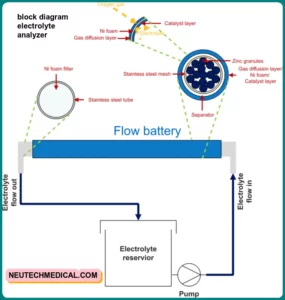What Is An Electrolyte Analyzer? How It Works And The Advantages And Disadvantages
Electrolytes are essential for our body to function correctly. This includes the electrolytes sodium, potassium, chloride, and magnesium. One way to check for these electrolytes is with an electrolyte analyzer.
If you are working out long enough and sweating profusely, you are losing electrolytes. When you sweat, you lose electrolytes and you need to replace them. It can be difficult to determine how much electrolytes you need to replace with only a urine test.
That is why an electrolyte analyzer can give you the correct amount of electrolytes you need. This guide will teach you the basics of an electrolyte analyzer and how it works.
Read about: blood cell counter
What is an electrolyte ?
Electrolytes are substances that are electrically charged and are found in the blood and other body fluids. They include sodium, potassium, calcium, magnesium, chloride, and bicarbonate.
They are essential for the body to function properly. An electrolyte analyzer is a device that measures these substances in the body and provides feedback.
The feedback can be useful to a person in diagnosing conditions such as dehydration and hyponatremia. There are advantages and disadvantages to using an electrolyte analyzer.
The advantages of using the device are that it is quick and easy to use, it is accurate, and it is inexpensive. The disadvantages of using the device are that it is invasive, it is not able to be used to diagnose conditions such as hypernatremia, and it is not able to be used to diagnose electrolyte disorders.
Article About:- Health & fitness
Article About:- Medical Technology
Article About:- IR News
Article About:-Amazon Product Review
Electrolytes Definition
An electrolyte analyzer is a device that can measure the composition of your blood, but it is not just for your health. It can also be used for sports and fitness, as well as for monitoring your health in other ways. It is important to be able to detect the composition of your blood, and the electrolyte analyzer does this with ease. It is also a very simple device to use. The devices are very affordable, and they are a great investment for any individual. One of the advantages of an electrolyte analyzer is that it is very easy to use.
You can use it without any instruction or without even knowing what the device is. All you need to do is to place a drop of blood on the device and let it run. You can also use it to monitor your health in other ways. What Is An Electrolyte Analyzer this question probably complete. There are also some disadvantages to the device. The device is not very accurate and can be off by as much as 30%. The device also does not have a large enough capacity to measure the blood of a large animal. The device is also not very user-friendly

How an electrolyte analyzer works
An electrolyte analyzer is a device that measures the electrolyte levels in a person’s body. Electrolytes are substances that regulate the balance of ions in the body, and are made up of a combination of water, minerals, and salts. electrolytes
Electrolytes are important to the body because they help regulate the amount of water that is needed, which helps with hydration. They also help keep the body’s organs and cells healthy. The electrolytes in the body are important to the proper functioning of the body.
Read More Article About: fully automatic biochemistryanalyzer

How are electrolyte measured and which machine is used to measure it?
Electrolyte analyzers measure electrolyte in serum, plasma and urine. The major components of an electrolyte analyzer are reagent, electrode module, peristaltic pump and sample probe. Automated systems feature extensive test menus, high throughput testing
In the laboratory, electrolytes are measured by looking at the concentration of the substance in a specific volume of blood. In general, these are the main ranges for electrolyte: Sodium: 136 to 144 mmol/L. Potassium: 3.7 to 5.1 mmol/L. What Is An Electrolyte Analyzer measuring value of all parameter should be mmol/l.
What are Electrolytes ?
Sodium, calcium, potassium, PH, chloride, phosphate and magnesium are all electrolytes. You get them from the foods and liquids you drink. The level of electrolyte in your body may be too low or too high. This happens when the amount of water in your body changes.

What are the Different Methods in Electrolyte Determination?
Several techniques are available to measure electrolyte: ion-selective electrode (ISE), atomic absorption, spectrophotometry and flame photometry. What Is An Electrolyte Analyzer several mode of method like deescribe above.
Read More Article About: blood gas analyzer

The advantages and disadvantages of an electrolyte analyzer
An electrolyte analyzer is a tool used by physicians to test the electrolyte levels in patients. It provides the physician with valuable information about the patient’s hydration level, which can help make decisions about the best treatment option.
The device measures the electrolyte levels in the patient’s blood, which can be used to determine if the patient is in need of intravenous hydration or dialysis. The advantages and disadvantages of an electrolyte analyzer The advantages of an electrolyte analyzer include.
It provides the physician with valuable information about the patient’s hydration level. -It can be used to determine if the patient is in need of intravenous hydration or dialysis. The disadvantages of an electrolyte analyzer include: -It’s expensive. -It can be inaccurate in some cases. -It takes time to process the test results. What Is An Electrolyte Analyzer all question should be covered.
What Is An Electrolyte Analyzer
check your health status in home with this equipment. this is user friendly and easy to use




























